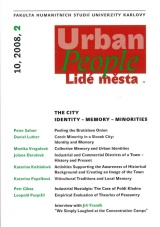Collective Memory and Urban Identities
DOI:
https://doi.org/10.14712/12128112.3708Klíčová slova:
collective memory, identity, identification, urban spaceAbstrakt
My paper focuses on the construction of the collective memory of certain social groups in an urban space. I studied issues related to re/construction of the collective memory and related group identities in two separate but interrelated research probes. In the first case, I looked at the way in which the picture of a city was constructed in biographic narratives of the members of a group of small business owners and tradespeople as part of the urban middle class who lived in the studied city between 1918 and 1948. I studied this heterogeneous group (members of the Slovak majority as well as the Jewish minority) in the years from 1987 to 1997 and, through an analysis of their biographic narratives and oral histories I strove to reconstruct their way of life and their place in city life in the first half of the 20 th century through their values system and everyday active participation in urban life and culture. In the second field research I focused on efforts and concrete steps of present-day urban elites and political representatives (members of the municipal council, local government and employees of the City Hall) in the creation of the image of the city. Both pieces of field research were carried out in the same city and they encompass a broad spectrum of issues related to social and collective memory, identity of the individual, as well as reflection on the urban space in the memory of certain social groups, and also the presence or absence of this specific group in the public space of the city and in the collective memory of its inhabitants.In my paper I use the concepts of collective memory, identity, identification which have been at the center of interest of social scientists in Central Europe since the mid-1980s. In Slovakia, more attention has been paid to the concepts since the late 1980s and also in relation to political and social changes after 1989.
Stahování
Publikováno
Jak citovat
Číslo
Sekce
Licence

Tato práce je licencována pod Mezinárodní licencí Creative Commons Attribution-NonCommercial-NoDerivatives 4.0.


